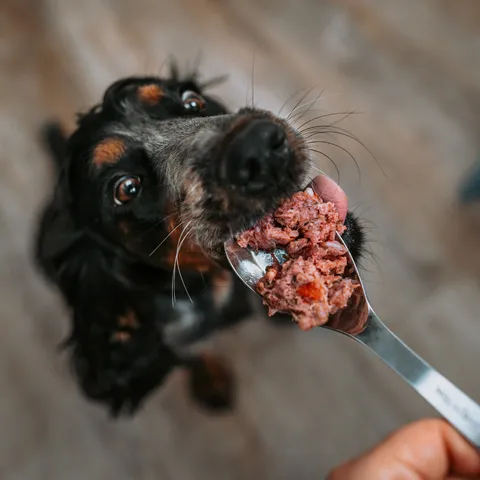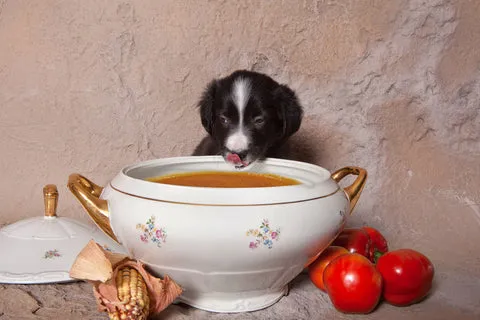Welcoming a new puppy into your home is a joyous occasion, filled with playful moments and endless cuddles. However, when your tiny companion falls ill and loses their appetite, it can quickly turn into a source of worry and anxiety. Puppies, especially, have delicate systems, and a lack of proper nutrition can quickly impact their recovery. Knowing What To Feed A Sick Puppy That Will Not Eat is crucial for boosting their energy levels and aiding their journey back to health. This guide will help you navigate this challenging time, offering practical advice and nutritious options to encourage your puppy to eat and recover.
Just like humans, puppies often go off their food when they have an upset stomach, a fever, or are simply feeling unwell. While it’s natural to be concerned, having a few healthy and digestible options ready can make a significant difference. Remember, if your puppy continues to refuse food, shows signs of severe illness, or their condition worsens, always consult your veterinarian for professional advice and a proper diagnosis. Their expertise is invaluable in ensuring your puppy receives the best possible care.
Understanding Why Your Puppy Isn’t Eating
A sick puppy’s refusal to eat can stem from various underlying issues. It could be a simple upset stomach due to dietary indiscretion, a more serious gastrointestinal infection, or even pain from an injury. Dental problems, parasites, or even stress from a new environment can also lead to a loss of appetite. Observing other symptoms, such as vomiting, diarrhea, lethargy, coughing, or unusual behaviors, can help you and your vet pinpoint the cause. Regardless of the reason, the primary goal is to provide gentle, appealing nutrition to support their immune system and recovery.
When a puppy is ill, their digestive system can be compromised, making it harder to process their regular food. This is why a bland, easy-to-digest diet is often recommended. The aim is to introduce food that is palatable, provides essential nutrients without taxing their digestive system, and ideally, encourages them to eat something, even in small amounts. This approach can help soothe their stomach, provide energy, and prevent dehydration, which is especially critical for young puppies. For specific guidance on suitable meals, you can refer to information on what food to give a puppy with an upset stomach.
Best Foods for a Sick Puppy with No Appetite
When your sick puppy won’t eat, offering a plain, bland diet of nutritious and easily digestible foods is usually the best approach. It’s always a good idea to have some of these options on hand in case your puppy’s health takes an unexpected turn.
1. Boiled White Meat
Plain white meat, such as chicken or turkey breast, is an excellent choice for a sick puppy because it’s lean, easy to digest, and low in fat. It provides essential protein that can help your puppy regain strength and soothe their stomach. Always ensure you remove all skin and bones before feeding to prevent choking and make it easier on their delicate digestive system.
To prepare:
- Thoroughly rinse the meat under cold water.
- Remove any excess fat, skin, or bones.
- Place the meat in a pot, cover with water, bring to a boil, then reduce heat and simmer for 15-20 minutes until thoroughly cooked.
- Drain the water and cut the meat into small, bite-sized pieces suitable for a puppy.
- Allow to cool completely before serving, either alone or with a small amount of white rice or mashed sweet potato.
2. White Rice
White rice is a staple in many bland diets for sick dogs, and its mild nature makes it a safe choice for puppies. While brown rice offers more nutrients, the blandness of white rice is easier for an upset puppy stomach to digest. It’s an ideal accompaniment to boiled chicken and can also help bind loose stools if your puppy is experiencing diarrhea, helping their digestive system return to normal.
To prepare:
- Rinse the rice under cold water.
- Add the rice to a pot with two parts water to one part rice.
- Bring to a boil, then reduce to a simmer, cover, and cook on low heat for about 18 minutes, or until all water is absorbed. Do not add salt for your puppy.
- Allow to rest and cool; fluff with a fork, then serve.
3. Sweet Potatoes
Plain, cooked sweet potatoes are gentle on a puppy’s stomach, making them a superb option for soothing their digestive tract. They are rich in vitamins, including essential calcium, iron, and magnesium, and packed with fiber, which can aid in digestion.
 Scoops of raw frozen dog food in a bowl
Scoops of raw frozen dog food in a bowl
Never feed raw sweet potatoes to your puppy, as they are hard to digest and can worsen stomach upset. Instead, peel the skins, chop the potatoes into small chunks, and boil them until very soft. Drain and mash them thoroughly, then allow them to cool before offering to your puppy.
4. Pumpkin
Similar to sweet potatoes, plain pumpkin is highly effective in easing an upset stomach and helping a sick puppy feel better. It’s rich in vitamins that support the immune system and full of fiber, which helps regulate digestion, whether your puppy is constipated or has diarrhea.
Canned pumpkin (100% pure pumpkin puree, not pie filling with added sugars or spices) can be as effective as fresh. Avoid any pumpkin products with added sugar or seasonings, as these can exacerbate your puppy’s stomach issues. You can offer a small amount, typically up to one or two tablespoons for a puppy, mixed with their other bland food or a tiny amount by itself.
5. Homemade Bone Broth
Bone broth is a powerhouse for sick puppies as it provides essential nutrients and minerals like sodium and potassium, and it’s excellent for hydration, especially if your puppy isn’t drinking enough water. It’s low in carbohydrates, gentle, and very easy to digest, making it an ideal choice for a puppy with an upset stomach.
 Small Chihuahua dog resting comfortably
Small Chihuahua dog resting comfortably
When preparing bone broth, avoid using garlic or excessive salt, as these can be harmful to puppies and further upset their stomachs. Focus on beef, pork, chicken, or turkey bones.
To prepare:
- Add beef or pork marrow bones and/or chicken or turkey bones to a large cooking pot.
- Cover with a few inches of water and simmer on low heat for 20-24 hours.
- Once done, strain to remove all bones and bone fragments, then serve the liquid (cooled) in small amounts.
6. Baby Food
If your puppy is struggling significantly with their stomach and refusing most other foods, stage 2 meat-based baby foods (such as chicken, lamb, or turkey) can be an effective feeding option. These foods are typically very smooth, easy to chew and digest, and can be palatable enough to tempt a reluctant eater.
 Collie dog looking expectantly at an empty food bowl
Collie dog looking expectantly at an empty food bowl
Crucially, always check the ingredients list to ensure there are no additives or ingredients toxic to dogs, such as garlic or onion powder. If you’re unsure about any specific ingredients, consult your vet before offering it to your puppy.
7. Fish
Fish, particularly plain, poached white fish like cod or haddock, is a wonderful source of healthy fats and vitamins that can significantly boost your puppy’s health and immune system when they’re unwell. The strong, appealing smell of fish can also be very enticing, often encouraging a puppy that has lost its appetite to eat.
Prepare fish by poaching it gently in water. Similar to boiling chicken, add the fish to a pan of water, bring to a boil, then reduce and simmer for 10-15 minutes until fully cooked. Carefully remove all bones and skin, then flake the fish into small, manageable pieces before feeding it to your puppy.
8. Oatmeal
Plain, cooked oatmeal, made from rolled oats, can be very soothing for a puppy’s upset stomach. It’s high in fiber, which can help with constipation, and contains antioxidants that may reduce stomach inflammation.
While beneficial, moderation is key with oatmeal. It’s rich in fiber, and too much can potentially make a sick puppy feel even worse. Offer it in small quantities, cooked with water (not milk), and without any sugar or other additives.
9. Plain Yogurt
Plain, unsweetened yogurt, especially varieties with live and active cultures, is packed with probiotics that are excellent for aiding digestion and supporting gut health. If your puppy has constipation or a mild upset, a small amount of plain yogurt can help regulate their digestive system.
 Adorable puppy eagerly licking a bowl of bone broth
Adorable puppy eagerly licking a bowl of bone broth
Ensure the yogurt is truly plain, natural, and free of any artificial sweeteners (especially Xylitol, which is highly toxic to dogs) or added fruits. It’s readily available at most grocery stores and can even be frozen into small, cool treats for a sick puppy on a warm day.
10. Eggs
Provided your puppy isn’t actively vomiting, eggs are an excellent food choice. They are gentle on the stomach and provide a good source of easily digestible protein. Eggs can also offer an energy boost if your puppy is feeling lethargic after an illness.
Scrambled without butter or oil, or simply boiled, are the best ways to prepare eggs for your puppy to ensure they are gentle on their stomach. However, if vomiting is still present, it’s best to avoid eggs completely until their stomach has settled.
Encouraging a Puppy That Won’t Eat
Even with the most appealing bland diet, a sick puppy might still be reluctant to eat. Here are some strategies to encourage them:
- Small, Frequent Meals: Instead of large meals, offer very small portions every few hours. This is less overwhelming for a sensitive stomach and can prevent further upset.
- Warm it Up: Gently warm the food to body temperature. This can enhance the aroma and make it more appealing. Ensure it’s not too hot to avoid burning their mouth.
- Hand-Feeding: Sometimes, the comfort of being hand-fed by their owner can encourage a sick puppy to eat. Offer tiny pieces directly.
- Quiet Environment: Provide a calm, quiet place for your puppy to eat, away from distractions or other pets.
- Hydration is Key: Even if they aren’t eating, ensure they are staying hydrated. Offer fresh water frequently, ice chips, or diluted bone broth. Dehydration is a serious risk for sick puppies.
- Consult Your Vet: If your puppy still refuses to eat for more than 24 hours, or if their condition worsens, it’s vital to seek immediate veterinary attention. They may require appetite stimulants, anti-nausea medication, or even intravenous fluids to support them. You can also explore general advice on what to feed a sick dog for broader dog health tips.
What Not to Feed Your Sick Puppy
Just as important as knowing what to feed is knowing what to avoid. When your puppy is sick and not eating, certain foods can exacerbate their condition or be outright harmful. These include:
- Their regular kibble: It can be too rich and difficult to digest.
- Fatty foods: High-fat foods can lead to pancreatitis or worsen an upset stomach.
- Spicy or seasoned foods: These can irritate the digestive tract.
- Dairy products (other than plain yogurt): Many puppies are lactose intolerant and dairy can cause digestive upset.
- Human treats or table scraps: These often contain ingredients harmful to dogs.
- Foods toxic to dogs: Always be aware of the list of foods not to feed dogs, such as chocolate, grapes, onions, garlic, and Xylitol. Even seemingly harmless fruits not safe for dogs should be avoided.
When to Seek Veterinary Care
While this guide offers helpful advice, it’s crucial to recognize when professional veterinary care is necessary. You should contact your vet immediately if your puppy:
- Refuses to eat for more than 24 hours.
- Is repeatedly vomiting or has severe, bloody diarrhea.
- Appears lethargic, weak, or unresponsive.
- Shows signs of pain, such as whining, panting, or a hunched posture.
- Has pale gums or difficulty breathing.
- Is a very young puppy (under 12 weeks), as their condition can deteriorate very rapidly.
 Multiple Doodle puppies eating from a communal plate
Multiple Doodle puppies eating from a communal plate
Early intervention can prevent more serious complications and ensure a faster recovery for your beloved companion. Never hesitate to call your vet if you’re concerned about your puppy’s health.
Beyond Short-Term Illness: Addressing Ongoing Sensitivities
If your puppy regularly suffers from an upset stomach or is frequently sick, it’s worth consulting your vet to determine if they have food-related allergies or breed-specific sensitivities. Regular kibble can sometimes be problematic for sensitive puppies.
Cold Pressed Dog Food
Cold-pressed dog food is an excellent alternative to traditional kibble, especially for puppies with food-related allergies or sensitive stomachs. This dry food undergoes minimal processing at much lower temperatures than conventional kibble, preserving a greater nutritional value. Its unique manufacturing process makes it easily broken down in the stomach, aiding digestion. Many cold-pressed options are also grain-free, perfect for puppies with grain allergies.
Insect Protein Cold Pressed Dog Food
For puppies with severe meat-related allergies or sensitivities, insect protein cold-pressed dog food offers a complete and nutritionally balanced alternative. Insects contain high levels of protein, comparable to or even exceeding chicken or beef, ensuring your puppy receives all essential nutrients. Furthermore, insect protein is often hypoallergenic and low in purines, making it an ideal choice for sensitive tummies.
Raw Frozen Dog Food
If your puppy is a fussy eater or highly sensitive to their current diet, raw food can be a beneficial dietary change. Raw frozen dog food is made from natural ingredients that are minimally processed and often grain-free. This can significantly aid digestion and improve overall health, including coat and skin condition. Raw food diets often come in various formulations, allowing you to tailor your puppy’s meals to their specific needs and allergies.
 Cute puppy with yogurt on its muzzle
Cute puppy with yogurt on its muzzle
Conclusion
Seeing your puppy sick and refusing to eat is undeniably distressing for any pet parent. However, by understanding the potential causes and knowing which gentle, nutritious foods to offer, you can significantly support their recovery. A bland diet, coupled with diligent observation and timely veterinary consultation, forms the cornerstone of effective care for a sick puppy. Remember, every puppy is unique, and what works for one may not work for another. Always prioritize your veterinarian’s advice, as they can provide the most accurate diagnosis and treatment plan tailored to your puppy’s specific needs. Your patience, love, and attentive care are the most vital ingredients in helping your furry friend bounce back to their playful self.
